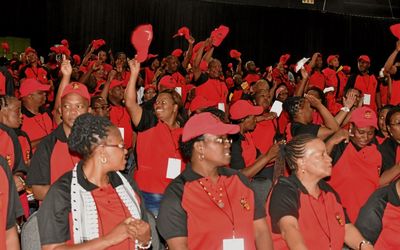THE seven economists appointed to set the country’s minimum wage began their work on Thursday with the biggest labour federation in SA warning the state to approach the process with urgency.
The panel, appointed by Deputy President Cyril Ramaphosa, held meetings with National Economic Development and Labour Council (Nedlac) constituents to receive input on a minimum wage floor.
The panel is expected to announce a floor in two months.
Nedlac spokeswoman Kim Jurgensen said on Thursday the panel had met with constituents to establish positions and what informed them. More meetings were scheduled for coming weeks.
In his 2014 state of the nation address, President Jacob Zuma first announced that Ramaphosa would lead a process to determine a minimum wage as part of broader efforts to tackle economic inequality and labour instability.
The Congress of South African Trade Unions (Cosatu) said the process was meant to have been concluded in June 2015 and warned against further delays.
"We hope the government, in line with the mandate from the ruling party, will instruct its negotiators to approach this matter with the necessary urgency and focus.
"We caution big business that any delaying tactics will be rejected by labour, as well as any attempts to entrench the current ultralow wage structure," Cosatu said.
In May 2016, Cosatu said the process had reached deadlock after failure to agree on a minimum wage level that would protect growth while tackling inequality.
The state has proposed a floor of between R2,000 to R3,000 a month, business about R1,800 — or a floor close to the lowest sectoral determination, to make it as broad as possible — and Cosatu between R4,125 and R5,276.
The panel will be chaired by Imraan Valdodia, Dean of the faculty of commerce, law and management at the University of the Witwatersrand and part-time member of the Competition Tribunal.
Other members include Mamokete Lijane, an Aluwani Capital Partners strategist; Debbie Collier, an associate professor in the department of commercial law at the University of Cape Town; Murray Leibbrandt, pro vice-chancellor — poverty and inequality at the University of Cape Town; Siphokazi Koyana, a skills development and training expert; Oxfam economic justice programme head Ayabonga Cawe; and Patrick Belser, a senior economist at the International Labour Organisation.

Picture: FREDDY MAVUNDA
THE seven economists appointed to set the country’s minimum wage began their work on Thursday with the biggest labour federation in SA warning the state to approach the process with urgency.
The panel, appointed by Deputy President Cyril Ramaphosa, held meetings with National Economic Development and Labour Council (Nedlac) constituents to receive input on a minimum wage floor.
The panel is expected to announce a floor in two months.
Nedlac spokeswoman Kim Jurgensen said on Thursday the panel had met with constituents to establish positions and what informed them. More meetings were scheduled for coming weeks.
In his 2014 state of the nation address, President Jacob Zuma first announced that Ramaphosa would lead a process to determine a minimum wage as part of broader efforts to tackle economic inequality and labour instability.
The Congress of South African Trade Unions (Cosatu) said the process was meant to have been concluded in June 2015 and warned against further delays.
"We hope the government, in line with the mandate from the ruling party, will instruct its negotiators to approach this matter with the necessary urgency and focus.
"We caution big business that any delaying tactics will be rejected by labour, as well as any attempts to entrench the current ultralow wage structure," Cosatu said.
In May 2016, Cosatu said the process had reached deadlock after failure to agree on a minimum wage level that would protect growth while tackling inequality.
The state has proposed a floor of between R2,000 to R3,000 a month, business about R1,800 — or a floor close to the lowest sectoral determination, to make it as broad as possible — and Cosatu between R4,125 and R5,276.
The panel will be chaired by Imraan Valdodia, Dean of the faculty of commerce, law and management at the University of the Witwatersrand and part-time member of the Competition Tribunal.
Other members include Mamokete Lijane, an Aluwani Capital Partners strategist; Debbie Collier, an associate professor in the department of commercial law at the University of Cape Town; Murray Leibbrandt, pro vice-chancellor — poverty and inequality at the University of Cape Town; Siphokazi Koyana, a skills development and training expert; Oxfam economic justice programme head Ayabonga Cawe; and Patrick Belser, a senior economist at the International Labour Organisation.




















